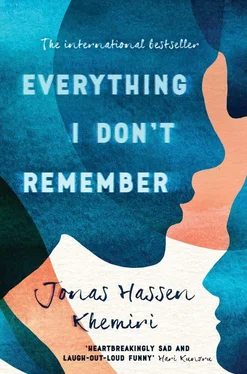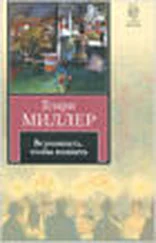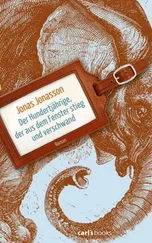The first time I ever hear of Samuel I’m living in Berlin.
*
This is the last time we’ll see each other. Before we’re done I want you to show me the money. Put it on the table. I want to see it before I tell you the end.
*
I have just walked down to the cobblestone street. I’m bending over to unlock my bike when I hear a mewling sound behind me. I turn around to find my neighbor. Not the schizophrenic German war veteran who puts up signs all over the stairwell about how together we can “drive the talking dildos out of the walls.” Not the unemployed Portuguese architect. But that girl, the Swedish artist, who for some reason wants to be called Panther.
*
Here are my memories from the last day. Samuel and I hadn’t spoken in a month or so. After he moved, I went out to Kungens Kurva now and then. I didn’t do anything in particular. I walked around the parking lot. I grabbed a coffee. Sometimes I stood in the place where it happened and thought about how much better it would have been if it had been me and not my brother. There was a note outside the transport school that said that the museum at Skansen was hiring new train drivers. I smuggled the note into my pocket and called the manager later that same day.
*
My neighbor is huddled outside the door, she has dark streaks of make-up on her cheeks. Several minutes pass before she manages to tell me what happened. She was standing at a market in Kreuzberg, someone called to say that her childhood friend had died in a car crash. Then she walked all the way home. Why didn’t you take the U-Bahn? I wonder. And why does the name Samuel sound familiar? Did I meet him? Was he the one who visited you last summer, the guy who was sitting at that outdoor restaurant with a friend as big as a bodyguard?
*
The train looked like a toy train but it went on tires instead of rails and it had a steering wheel and a stick shift, just like a bus. Three cars and one locomotive. The tourists loved it. The manager said that it was hard to maneuver the train, especially when it was packed full of tourists, because then it weighed over three tons. But for me, a person used to parallel parking fifteen-foot trucks at rush hour, it was a piece of cake.
“You’re a little older than the people we usually hire,” said the manager, but he said it as a compliment.
*
Three months later I move home from Berlin. I give up the novel project with the working title The Genderless Love Story , which I have spent four years not finishing. I return home to Stockholm with fewer pages than I had when I moved down.
*
But still I was nervous when it was time to drive my first circuit. I was wearing the red coverall. The nametag showed everyone my name. I had driven it a few times without any tourists so I could learn to time the guide voice. I knew how slowly I needed to drive for the English-speaking voice to say “Stockholm. Look at her. Isn’t she beautiful?” as we crossed the Djurgården bridge. I knew how quickly I needed to drive down Strandvägen for the voice to say “To the right we see the prestigious Royal Dramatic Theater” as we passed Dramaten. I knew I had to zoom past Kungsträdgården so we didn’t end up stuck on the bridge as the guide voice started talking about the palace and Gamla Stan. The manager explained that this part of the route was new, an experiment, but if all went well and I did a good job they would continue to run the tours through the city and it wasn’t out of the question that my short-term employment for this project could turn into a full-time job.
*
Then Grandma gets a blood clot. M’s dad has a heart attack. D’s aunt dies of lung cancer. A friend’s son sniffs glue and dies of cardiac arrest. B and P are run down by a drunk driver on Birger Jarlsgatan.
And then E, who—
E, who—
I try to write it, but it doesn’t work, I can’t write it, it’s too soon. Too soon? It’s too late, when will you understand that it is too late?
*
Up on Katarinavägen you could choose whichever speed you liked, because the voice went on and on about the view and the cobblestones and the historical buildings. On Fjällgatan we made a stop for coffee and ice cream and photos.
*
I ought to write it, I try to write it.
And then E, who—
E, who—
But I can’t, I can’t, if I write it it’s like it really happened. It did happen, when will you realize that it happened? It happened it happened it happened it happened.
*
Fifteen minutes later I was driving back toward Skansen. The voice coming from the speakers was automatic, all I had to do was drive at the correct speed and ignore the teenagers who were laughing and pointing.
*
After E’s funeral I start doing research on Samuel. I contact people who lived in his grandma’s house, I email his mom and sister, I call up the girl who rented her apartment to him, I have coffee with his old basketball coach. I convince myself that I am a part of the real world, that words are not more important than people, that all I want is to try to understand what happened. But is that really true?
*
After a few days at my new job I felt confident behind the wheel. I joked around with my coworkers, I brought my lunch in a lunchbox. I was finally on the right track. Soon I would be able to start paying back the loan from Hamza. I thought about reaching out to Samuel pretty often. But I didn’t do it. I didn’t call him and he didn’t call me.
*
I record voices and ask follow-up questions, I listen and nod as people say that it was an accident, he lost control, he ran into a tree, he fell asleep at the wheel, it wasn’t anyone’s fault, it really wasn’t anyone’s fault. The only one at fault would be Samuel, if he had been driving too fast. And maybe his uncles, if there was something wrong with the car.
*
It happened on a Thursday afternoon in April, two thousand twelve. I was up on Fjällgatan with the train. The group of tourists were a white-toothed American family, a few British girls, three young people from Japan, and two middle-aged guys, Italians or maybe Croatians, suntanned with expensive shoes. Everyone had been impressed by the view, had taken their photos, drunk their coffee, eaten their ice cream. Soon we would go back downtown. My phone vibrated. It was a foreign number. I answered.
*
People say that if it was anyone’s fault, it was the fault of the home. They ought to have taken better care of his grandma, if they had discovered her infected foot maybe she would have passed the simulator test and then maybe Samuel would have been in a better mood when he drove off.
*
Panther’s breathless voice told me what had happened. Sometimes I think about that phone call. What would have happened if I hadn’t answered. How long it would have been before I found out. I wouldn’t have gotten fired. I would have driven back downtown, waved goodbye to the tourists, parked the train, and gone home. But I answered the phone.
*
People say that the dementia home had nothing to do with it. It wasn’t the nursing staff’s fault, and it wasn’t the parking lot attendant’s fault, either. It was no one’s fault. But it never would have happened if Panther hadn’t moved away. She left him and stopped calling and her betrayal reminded him of other betrayals and that was what made him drive off the road.
*
Panther told me that someone had called her from the scene of the accident, they had found Samuel’s phone and dialed the most recently called number.
“It must have just happened, it was close to a gas station in Solberga. Apparently they’re waiting for the fire department.”
*
People say that’s a load of crap, he and Panther kept in touch, she called him on the last day, the last text he sent was to her. The only one who has any blame in this is Laide, because she said she loved him but she was never brave enough to let him in for real. She was terrified of the feelings he awoke in her and when he got too close she made him start doubting himself, he started to see himself through her critical gaze, and that was what made it impossible for him to keep living.
Читать дальше












